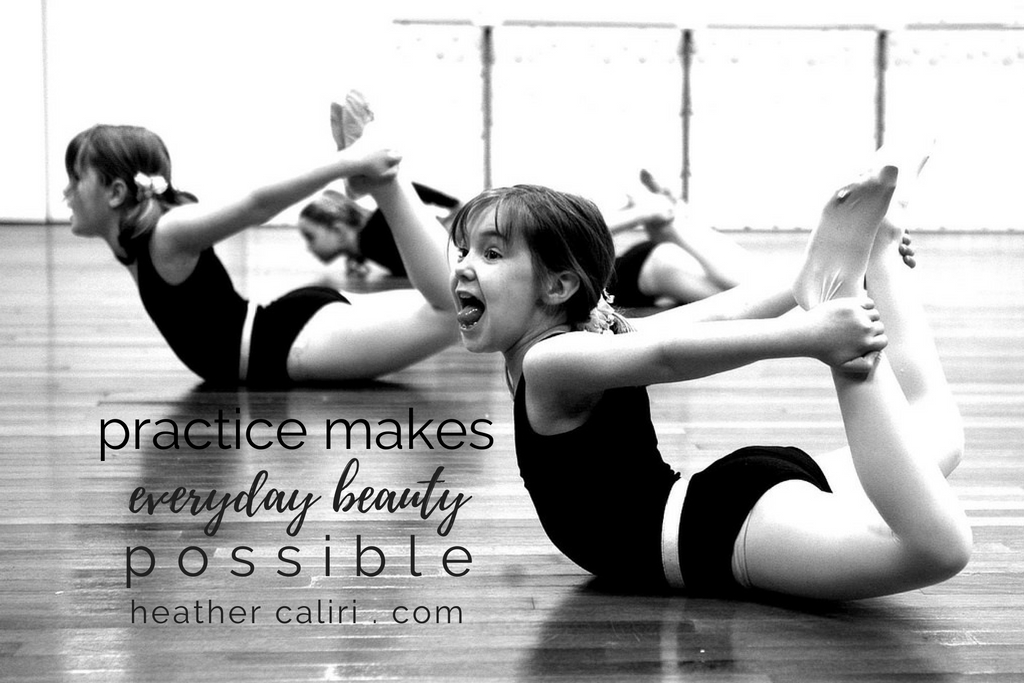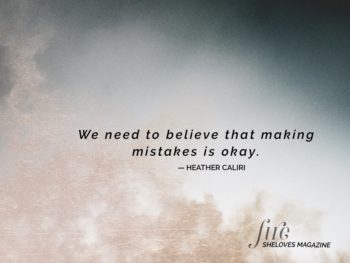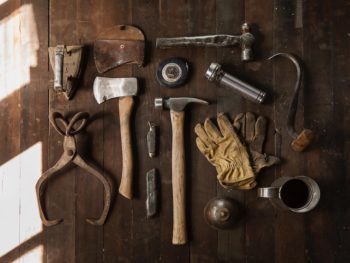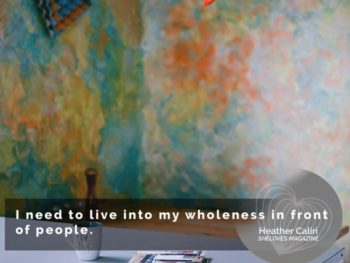
I grew up practicing ballet—fifteen years of plies, pointe shoes and pirouettes. I played Clara in the Nutcracker, got a chance to dance with the San Francisco Ballet in junior high, and got a whole lot of blisters.
Ballet is an exacting art form. One class I took was literally called “Perfection”. Every class, we eyed ourselves even more closely in the mirror than normal, trying to correct every flaw.
I didn’t get a complex or anything.
Perfectionism runs rampant in our culture. Brené Brown defines it thus: ““Perfectionism is a self-destructive and addictive belief system that fuels this primary thought: “If I look perfect, live perfectly, and do everything perfectly, I can avoid or minimize the painful feelings of shame, judgment, and blame.””
I saw this in ballet all the time. Abusive teachers, students so worried about weight they starved themselves, and my own angst about performance and parts. If you weren’t the best, did you matter? Were you willing to do anything–even sacrificing your own health–to measure up to an impossible standard?
But despite all that perfectionism, ballet also gave me one of the biggest antidotes to perfectionism I’ve ever learned.
Her name was Claire.
Dance As If No One Is Watching
Claire was a few years older than me, and when she graduated, she went on to dance professionally, rising to the level of principal dancer.
That’s the ballet equivalent of getting into the all-star team for the NBA.
One year, Claire guest-starred in our spring performance, so she attended our advanced Saturday class a few times. I stood behind her once, and felt just the tiniest bit intimidated. But after about one exercise, I stopped being intimidated and started feeling amazed.
In ballet, you repeat the same basic movements in every class, in the same order: plié, tendu, fondue, developé, etc. The sequence of steps varies, but the order of class is as predictable as a nursery rhyme.
When I took class, I tried to do my best for the teacher. I worked hard so he or she would notice me. I tried to do the steps correctly.
When I watched Claire, though, I realized she wasn’t working for the teacher. She wasn’t aiming for correctness.
Instead, she danced.
Of course, technically, she looked amazing, but that wasn’t the part that entranced me. No, her face was alive. She looked like she was making art, rather than going through motions.
Here’s the craziest thing: The joy in her face wasn’t about working hard. No: it was a simple attitude shift. Instead of checking off boxes or impressing people, Claire tried to bring beauty into the world.
Our school’s Saturday class had no impact on her career. She wasn’t just keeping in shape. It wasn’t about proving she was the best one there.
It was about experiencing loveliness.
She practiced as if practice itself was a prize.
And in that class, I realized that attitude was available to me, right then, and right there. I never danced the same in class again.
Practice Makes Beauty
I love the phrase “spiritual practice” because of its double entendre. I love it especially because I didn’t understand the double meaning for a long time. Usually, we think of spiritual practices as sort of Better Person weight-lifting. We read our Bible to get closer to God. We pray or meditate to deepen our faith. We go to services to get More Spiritual.
Like ballet classes, practices can be as predictable as a nursery rhyme. Too easily, they become rote checkboxes.
But on a deeper level these little routines are actually faith. Not exercises to get us to a destination, but the destination itself.
Instead of God asking us to work up to some culmination of Faithful Person, we are given these ridiculously easy things to do that plant loveliness in our everyday. Practices bring beauty into our hearts without much effort. They give us a taste of true Perfection and make our whole beings come alive.
Not because we’re technically proficient. Not because we’re “good” at them. But bending our hearts to things of beauty brings joy.
Practice Everything
It’s a mistake to pigeonhole “spiritual practices” as exclusively belonging to religion. Everything can be a spiritual practice, and every practice has a kind of spirituality in it. When we do anything regularly—whether it’s practicing piano, raising kids, gardening, or keeping house—we have the choice to do it with our faces alight, or not.
Every time we make a practice a simple experience to beauty, we find the antidote to perfectionism. By living our lives in the pursuit of beauty, we can find it literally everywhere. We don’t have to measure up to anything. We just have to live.
Instead of assuming it’s only worth doing ballet with your whole heart if you get the attention of the teacher, you find beauty no matter whether anyone responds.
Instead of keeping trying to be a “good housekeeper,” you can see taking care of people and stewarding resources is a beautiful thing, and enjoy the order for its own sake.
Instead of trying to become a “successful” writer, you can find meaning in the beauty of the written word every time you sit down to type.
Practice doesn’t make perfect. Practice makes everyday beauty possible.
And it’s always available, in everything we do. It doesn’t require hard work, or even proficiency. It just requires you to find the loveliness in the moment right in front of you—and savor it.
Image credit: Peter Overman with my modifications














 I Am the Privileged: For SheLoves
I Am the Privileged: For SheLoves
It’s good to hear bits and pieces of your story. I love that you’re a dancer. Today, as one of my pieces came out, and as I submitted another essay into a magazine contest, I spent a lot of time thinking about the craft and the work of being a writer — I just applied for an MFA program and I’m nervous.
When I wrote As Waters Gone By, and then An Ordinary Love, I found something that I’d been looking for my entire life. And when I wrote my latest fantasy novel, The Girl Who Calls the Wind, I hit a place inside me I’ve rarely experienced before or since. The joy was inexpressible. The delight was magnificent. I found that joy writing in the dark, alone on thirty acres, in the most destitute place I’ve ever been. I didn’t know if anyone would EVER read that manuscript. And I didn’t care. I wrote it because it was inside me and when I write, I feel God’s pleasure. Especially, when I write the stuff that’s buried deep inside.
Anyways, love to you dear woman as you write …
T
Oh, Tina! Congrats on the application. I hope you get accepted. (Where did you apply?)
I’m sorry you went through that destitute place, but it is such FIERCE POWER to make something beautiful in the midst of it. I can see how writing would save you and heal you and empower you to do what you had to do. And I am so grateful, always, for the way writing has enabled me to do the same. xoxoxoxox
Oooohhh Heather, as a recovering perfectionist this really hit my heart! So good! Thank you!
Oh, good! And you’re welcome 🙂
I love this Heather. Such a heart changer.
You made my heart sing, thank you!
Oh, yay! Thank you 🙂
Practice makes beauty. Yes! I took ballet classes for about ten years as a kid. I loved it. I think my experience was much lower pressure than yours. Just small town classes taught by high school or college students. No roles to audition for, just the yearly recital. Maybe that’s part of why I loved it so much…ballet was one of the few areas in my life where I didn’t feel intense pressure to be perfect. I didn’t dance at all for years. Now I’ve made a few minutes of ballet part of my pre-writing routine. It’s a good way to get my blood flowing and clear my head, experiencing the music and the movement. It’s a good reminder that perfection is not necessary for creating value and beauty. Thanks, Heather.
I love knowing that you were a bun-head too 🙂 THere’s something so lovely about the movements and the repetition of stuff–a ballet class always seems like a bit of poetry to me. I agree–sometimes lower stakes do help us enjoy stuff more. I have mixed feelings–I loved having access to crazy-amazing dancers and teachers and getting to participate in professional productions. But the pressure can also be soul-destroying.